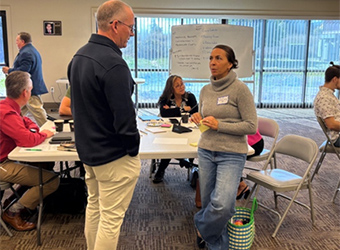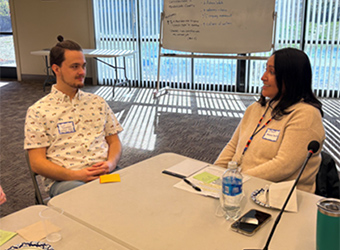In response to the nationwide doctor shortage that has hit rural communities especially hard, local healthcare organizations in Mendocino County are collaborating to recruit and retain medical providers through an initiative called Incubate. Originally intended to retain family medicine residents (doctors-in-training) in Mendocino County, Incubate recently re-launched with an expanded scope to focus on recruiting and retaining medical providers countywide.

According to the Association of American Medical Colleges, the United States does not have enough doctors to meet current demand, and the country is likely to face a shortage of as many as 86,000 physicians in the next ten years. Access to medical care in rural communities will suffer disproportionately because while 20% of the U.S. population lives in rural communities, only 10% of doctors practice there.
One way to limit the effects of having so few doctors is to bring more medical providers into the healthcare industry. Advanced practice providers such as nurse practitioners, physician assistants, certified nurse midwives, and nurse anesthetists can now be licensed to do some of the work that used to belong to doctors alone. But even with these additional providers, the need for medical care often outstrips the medical community’s ability to provide it.
This situation affects everyone–patients and medical personnel alike. People seeking medical care either face long waits or must travel out of the area to get treatment (or both), while medical providers trying to meet an overwhelming demand begin to burnout, especially when they’re on the receiving end of patients’ frustration over issues out of their control such as scheduling, billing, and insurance coverage.
MCHC Health Centers CEO Rod Grainger noted that while local health centers offer same-day appointments, and hospital emergency rooms are always available in a crisis, it can take a long time to get an appointment for check-ups and other preventive care–the kind of appointments that can keep people out of emergency rooms.
Grainger was one of the founders of Incubate in 2022. He often says that his job is to take care of the people who take care of people. “That means creating an environment where our providers feel welcomed, supported, and part of a team. Our effort in Incubate is to broaden that focus so providers feel at home and connected with their community. Community, in this case, means both the larger provider community of Mendocino County as well as the community or neighborhood in which they live. It also means we work to reduce the competitive nature of our current recruitment strategies. If MCHC makes the first connection with a potential candidate and we let them know there are other options in the county, and they end up in Fort Bragg—that is a win for our community,” he said.

In November, Incubate officially re-launched when more than 20 healthcare leaders and community members from across Mendocino County gathered at Consolidated Tribal Health Project in Redwood Valley.
Participants discussed ways to identify, test, and share strategies to enhance the provider and patient experience, and to make Mendocino County a great place to live, work, and receive care. This gathering offered a unique opportunity for primary care and specialty care clinicians, administrators, residents, and residency staff to collaborate. Participants hope Incubate can help build relationships, enhance communication, foster trust within the community, support efforts to improve access to care, and enhance the patient experience.
Participating clinics included Adventist Health Family Medicine Residency Clinic, Anderson Valley Health Center, Baechtel Creek Medical Clinic, Consolidated Tribal Health Project, Mendocino Coast Clinics, MCHC Health Centers, and Redwood Coast Medical Services, with participation from Adventist Health Ukiah Valley Hospital, Alliance for Rural Community Health, Adventist Health Howard Memorial Hospital, Adventist Health Mendocino Coast Hospital, and Partnership HealthPlan of CA.
Incubate Steering Committee members continue to meet regularly to build on the momentum of November’s meeting.
Contact:
Miranda J. Ramos, Program Director
Alliance for Rural Community Health/Community Health Resource Network
(707) 813-0778 | MRamos@ruralcommunityhealth.org

 MyChart Login
MyChart Login

